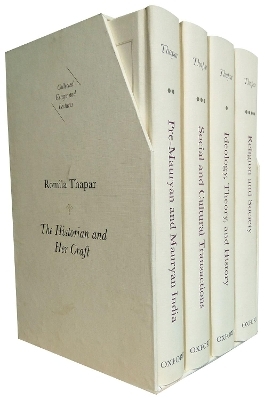
The Historian and her Craft
OUP India (Verlag)
978-0-19-946715-0 (ISBN)
The introduction to the set by Romila Thapar will explore her academic life and approaches to early Indian history and history writing. It will incorporate a detailed analysis of all the trends and transformations in historical thinking and history writing that have shaped the last six decades of Indian history.
The set of volumes would conserve and reflect on the life and work of an eminent historian of India.
Romila Thapar is Professor Emeritus of History at Jawaharlal Nehru University, New Delhi. She has researched and written extensively on early Indian history including its historiography-both as written in those times and as in the present. In 2008 she was awarded the John W. Kluge Prize for Lifetime Achievement in the Study of Humanity.
Volume I - Ideology, Theory, and History
Introduction to the Set - Romila Thapar
Introduction to the Volume - Neeladri Bhattacharya
Decolonising History
1. Ideology and the Interpretation of Early Indian History
2. Early India: An Overview
3. The Decolonization of History: Early India
Marxism, Sociology and the writing of History
4. Durkheim and Weber on Theories of Society and Race Relating to Pre-colonial India
5. The Contribution of D.D. Kosambi to Indology
Writing the Region
6. Regional History: The Punjab
7. Regional History with Reference to the Konkan
Secularism and the Writing of History
8. Imagined Religious Communities? Ancient History and the Modern Search for a Hindu Identity
9. Secularism and History
10. The Historiography of the Concept of 'Aryan'
11. The Tyranny of Labels
The Question of Historical Consciousness
12. Society and Historical Consciousness: The Itihasa-purana Tradition
13. Was There Historical Writing in Early India?
Narrative - An History
14. A Historical Perspective on the Story of Rama
15. Sakuntala: Histories of a Narrative
16. Somanatha: Narratives of a History
Romila Thapar in conversation with Neeladri Bhattacharya
Index
Volume II - Pre-Mauryan and Mauryan India
Introduction to the Volume - Kumkum Roy
Starting Up
1. A Possible Identifi cation of Meluhha, Dilmun and Makan
2. Society in Ancient India: The Formative Period
Archaelogy and Texts
3. The Rigveda: Encapsulating Social Change
4. The Archaeological Background to the Agnicayana Ritual
5. Archaeological Artifacts and Literary Data: An Attempt at Co-relation
State and Empire
6. The Evolution of the State in the Ganga Valley in the Mid-first Millennium BC
7. The Early History of Mathura: Up to and Including the Mauryan Period
8. Towards the Definition of an Empire: The Mauryan State
9. State Weaving-Shops of the Mauryan Period
Inscriptions
10. Asoka and Buddhism as Reflected in the Asokan Edicts
11. Raya Asoko from Kanaganahalli: Some Thoughts
12. Literacy and Communication: Some Thoughts on the Inscriptions of Asoka
Beyond the Empire
13. Epigraphic Evidence and Some Indo-Hellenistic Contacts during the Mauryan Period
14. Text and Context: Megasthenes and the Seven Castes
15. The Role of the Army in the Exercise of Power in Early India
Romila Thapar in conversation with Kumkum Roy
Index
Volume III - Social and Cultural Transactions
Introduction to the volume - Rajan Gurukkal
Looking at Epics
1. The Historian and the Epic
2. Some Aspects of the Economic Data in the Mahabharata
3. Dana and Daksina as Forms of Exchange
4. The Ramayana: Theme and Variation
The Hero
5. Death and the Hero
6. As Long as the Moon and the Sun Endure
Genealogies and Claims to Status
7. Genealogical Patterns as Perceptions of the Past
8. Origin Myths and the Early Indian Historical Tradition
9. Clan, Caste and Origin Myths in Early India
10. The Mouse in the Ancestry
India and Europe in Early Times
11. The Image of the Barbarian in Early India
12. Indian Views of Europe: Representations of the Yavanas in Early Indian History
13. Black Gold: South Asia and the Roman Maritime Trade
Romila Thapar in conversation with Rajan Gurukkal
Index
Volume IV - Religion and Society
Introduction to the volume - Kunal Chakrabarti
Exploring New Ideas
1. Sacrifice, Surplus, and the Soul
2. Ideology, Society and the Upani?ads
3. Ethics, Religion and Social Protest in the First Millennium BC in Northern India
4. The Oral and the Written in Early India
The Social Role of the Renouncer
5. Dissent and Protest in the Early Indian Tradition
6. Renunciation: The Making of a Counter-Culture?
7. The Householder and the Renouncer in the Brahmanical and Buddhist Traditions
8. Millenarianism and Religion in Early India
Inclusion and Exile
9. The Puranas: Heresy and the Vamsanucarita
10. Exile and the Kingdom: Some Thoughts on the 'Ramayana'
11. Perceiving the Forest: Early India
Religion as an Aspect of Politics
12. Syndicated Hinduism
Forms of Patronage-Old and New
13. Cultural Transaction and Early India: Tradition and Patronage
14. Patronage and the Community
15. The Museum and History
16. The Museum Experience
Romila Thapar in conversation with Kunal Chakrabarti
Index
| Erscheinungsdatum | 17.04.2018 |
|---|---|
| Verlagsort | New Delhi |
| Sprache | englisch |
| Maße | 164 x 244 mm |
| Gewicht | 2650 g |
| Themenwelt | Sachbuch/Ratgeber ► Geschichte / Politik ► Vor- und Frühgeschichte / Antike |
| Geisteswissenschaften ► Archäologie | |
| Geschichte ► Allgemeine Geschichte ► Vor- und Frühgeschichte | |
| Geisteswissenschaften ► Geschichte ► Geschichtstheorie / Historik | |
| Geisteswissenschaften ► Geschichte ► Regional- / Ländergeschichte | |
| Geschichte ► Teilgebiete der Geschichte ► Kulturgeschichte | |
| Geisteswissenschaften ► Religion / Theologie | |
| ISBN-10 | 0-19-946715-3 / 0199467153 |
| ISBN-13 | 978-0-19-946715-0 / 9780199467150 |
| Zustand | Neuware |
| Haben Sie eine Frage zum Produkt? |
aus dem Bereich


